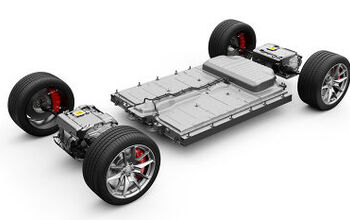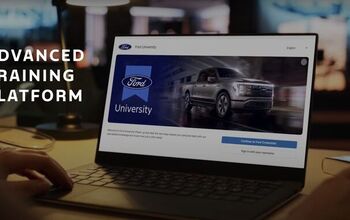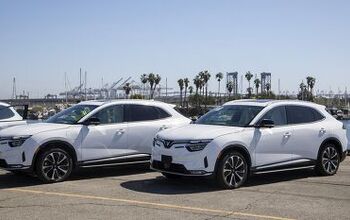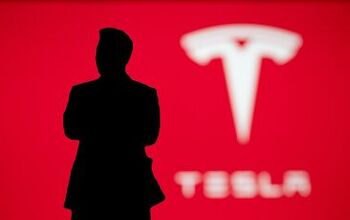Industry Begins Blaming the Bridge, Truckers in Ottawa

With the Ambassador Bridge having been cleared by police over the weekend, those protesting government mandates have literally been relegated to the sidelines. Canadian officers from a variety of departments, including Ontario Provincial Police, are now situated at relevant intersections and Windsor, Ontario, has declared a state of emergency in case demonstrators return.
But don’t think the story is over. The trucker blockade certainly caused trouble for the automotive sector and it suddenly seems interested in rolling the event into the industry’s ever-expanding list of excuses. Now that the rigs have all been removed, spokespeople have been chiming in and they’re being presented as rather single-minded on the matter. They want more assistance from the government to quash any protests that might impact their bottom line and are happy to have something else to blame for why the broader industry remains in such a pitiful state.
Flavio Volpe, head of the Automotive Parts Manufacturers’ Association (APMA), took to social media to complain that an insufficient number of protestors had been arrested. He also said that those who were taken in should have been charged with more serious offenses, suggesting the same should be applied to those still demonstrating in Ottawa.
“This is unacceptable. Decisions have consequences,” he said. “This is still a developing story from where I sit.”
Brian Kingston, President and CEO of the Canadian Vehicle Manufacturers’ Association (CVMA), made similar assertions this week. Despite the Canadian government declaring emergency powers that give police and financial institutions unprecedented levels of authority, he likewise suggested not enough was being done. But he’s also setting the stage for the automotive sector to use protesting as another convenient excuse for production shortfalls and ludicrously high vehicle pricing.
“Ongoing border blockades are disrupting trade and now hurting thousands of workers in the auto sector on both sides of the border,” Kingston said on Monday. “The time has come for our governments at all levels to enforce their laws, end the blockades and restore cross-border trade.”
Automakers, who spent the duration of the Detroit-Windsor blockade silent, have started to express their thoughts and feelings. Even as the Ambassador Bridge closure seemed to be having a direct impact on Michigan-based factories, automakers attributed production stalls to the semiconductor shortage that’s lasted for two years or unspecified bottlenecks. But, now that Ambassador Bridge has been cleared and the Canadian government has stepped up threats against demonstrators, companies are being less careful.
“This interruption on the Detroit/Windsor bridge hurts customers, auto workers, suppliers, communities and companies on both sides of the border that are already two years into parts shortages resulting from the global semiconductor issue, COVID and more,” stated Rose Pao, Communications Manager at Ford of Canada. “We hope this situation is resolved quickly because it could have widespread impact on all automakers in the U.S. and Canada. We are running our plants today in Oakville and Windsor at reduced capacity.”
Prior to Valentine’s Day, you couldn’t get industry spokespeople to formally weigh in on the potential ramifications of the Ambassador Bridge blockade even if you bribed them. Now that the crisis has passed, however, practically every major manufacturer with a facility in Michigan or Ontario has attributed future production problems to the trucking protests. PLANT, which covers Canadian manufacturing, has a full rundown of the public comments made by automakers on February 14th, here.
Fair enough. Even though I support the ongoing Freedom Convoy protests, millions in goods are said to come across the Ambassador Bridge on a daily basis and a significant portion of that can be attributed to auto parts. Civil disobedience is designed to inconvenience the state in the hope it brings attention to the cause and the blockades have undoubtedly been a sizable obstacle. But the situation has also provided business entities with another excuse for why they can’t seem to get their own acts together.
On Tuesday, Automotive News published a piece speculating as to the long-term ramifications of the bridge traffic being disrupted. Citing a report from the Anderson Economic Group (a company designed to make other companies look good), it estimated that direct industry losses amounted to $300 million, including a $155 million loss for automakers and $145 million in wages stemming from plant shutdowns. Though no automaker, near as TTAC can tell, had attributed any plant shutdowns or production stalls to the blockades until after police had removed demonstrators from the Ambassador Bridge.
“Within hours of the trade disruption at the Ambassador and Blue Water bridges, we observed shortages and then slowdowns at assembly plants,” Patrick Anderson, CEO of Anderson Economic Group, said in a news release. “Only some of that lost production can be made up given the tightness of the auto industry’s supply chain right now, so these are real losses to the men and women working in this industry.”
It also needs to be said that the global semiconductor shortage is estimated to have cost the automotive sector $210 billion in revenue just for 2021. That makes the blockade seem infinitesimal by comparison. However, it gives the industry another scapegoat for why it’s been incapable of constructing vehicles at anywhere near the normal pace. Deliveries in the United States were sitting pretty at 17 million deliveries in 2019. In 2020, that number was driven down to just 14,697,837 by our collective response to the pandemic. The following year was slightly better, but the U.S. still failed to crest 15 million units.
From AN:
Contract disputes between automakers and suppliers have become common since the COVID-19 pandemic and resulting microchip shortage have hampered production over the past couple of years.
In the case of the Ambassador Bridge closure, which blocked truck traffic, some suppliers resorted to flying parts back and forth. Air freight can cost 10 times more than moving parts on trucks, Rustmann said. While keeping assembly lines running amid crisis is the priority, OEMs and suppliers will eventually have to decide how the bill gets handled.
One benefit of dealing with so many recent supply chain kinks is that companies have a better idea how to handle the unexpected, said Michael Brady, co-chair of the automotive industry group at Warner Norcross + Judd.
The outlet questioned who would be paying for these additional expenses, casually implying costs will be transferred to the consumer as usual. But car buyers seem to have had all they can take of elevated vehicle pricing and lacking selections on dealer lots. Even valid excuses cannot be used forever and there’s mounting evidence that people living in North America are getting increasingly willing to hold onto whatever vehicles they have today than bother with the current market.
Thanks largely to inflation and corporate involvement in politics, consumer confidence is at an 11-year low, with the last several months representing the sharpest declines. Meanwhile, the U.S. Labor Department reported that the consumer price index rose 7.5 in January from a year ago. Ironically, the statistic became a common theme among Freedom Convoy demonstrators who faulted government restrictions and corporate greed as having been the presiding reasons for the ongoing economic strife. In the future, they’ll probably be lumped into reports speculating as to why industrial finances are in the toilet.
Canadian Prime Minister Justin Trudeau believes he can solve the swirling disharmony by enacting the Emergencies Act (formerly the War Measures Act) and giving police and financial institutions unprecedented levels of authority to stop public dissent. Despite having received numerous requests to sit down and debate with truckers, Trudeau and the Canadian Parliament narrowly elected (185-151) instead to give itself total authority to decide where citizens and businesses are allowed to be, how their money is managed, and what conditions constitute an offense worthy of arrest.
While Justin did say he intended to give police additional tools to combat protestors, adding that “everything is on the table,” he also indicated that he probably wouldn’t need to deploy the military on Canadian citizens. But he’s still taking fierce criticism for his actions.
The Canadian Civil Liberties Association said the truckers’ protests did not come anywhere near meeting the standards for Trudeau to have invoked the Emergencies Act, which exists for “the ability of the Government of Canada to preserve the sovereignty, security and territorial integrity of Canada” and exclusively for actions that “cannot be effectively dealt with under any other law of Canada.” While it’s technically never been used before, its predecessor (the War Measures Act) was reserved for World War I, World War II, and the October Crisis. The group expressed grave concerns surrounding the normalization of instituting high levels of centralized control and warned of the precarious situation it has placed the nation into.
The BBC similarly released an article suggesting that the conditions needed to utilize the Emergencies Act had not been met. Reuters also published a piece citing a report from Lori Williams, a politics professor at Mount Royal University, Calgary, warning that the government’s decision could ultimately bring on more hardship.
“There’s the danger this could create more problems, that’s why this has to be done with the cooperation of premiers and if they don’t want help, then the federal government needs to hang back. It has to be very targeted, very strategic and very restrained, because these are enormous powers that are being implemented,” she said.
As of the time of this writing, truckers and their allies are still sitting outside of the Canadian Parliament in hopes that someone will eventually sit down at a table to meet with them and discuss the issues. Ottawa Police Chief Peter Sloly has resigned, though it’s assumed he was pressured to leave so that the Royal Canadian Mounted Police (RCMP) and Ontario Provincial Police could assume command under the Emergencies Act. It’s assumed that aggressive policing will commence sometime this week and demonstrators will be forcibly removed. However, truckers have said they are not leaving and Canada’s towing companies have been broadly supportive of the movement thus far.
[Image: JL IMAGES/Shutterstock]

A staunch consumer advocate tracking industry trends and regulation. Before joining TTAC, Matt spent a decade working for marketing and research firms based in NYC. Clients included several of the world’s largest automakers, global tire brands, and aftermarket part suppliers. Dissatisfied with the corporate world and resentful of having to wear suits everyday, he pivoted to writing about cars. Since then, that man has become an ardent supporter of the right-to-repair movement, been interviewed on the auto industry by national radio broadcasts, driven more rental cars than anyone ever should, participated in amateur rallying events, and received the requisite minimum training as sanctioned by the SCCA. Handy with a wrench, Matt grew up surrounded by Detroit auto workers and managed to get a pizza delivery job before he was legally eligible. He later found himself driving box trucks through Manhattan, guaranteeing future sympathy for actual truckers. He continues to conduct research pertaining to the automotive sector as an independent contractor and has since moved back to his native Michigan, closer to where the cars are born. A contrarian, Matt claims to prefer understeer — stating that front and all-wheel drive vehicles cater best to his driving style.
More by Matt Posky
Latest Car Reviews
Read moreLatest Product Reviews
Read moreRecent Comments
- Theflyersfan Ford. (drops mic)
- FreedMike Sweet car, but that's a silly price.
- Big Al from Oz This article assume that future synthetic fuels will be hydrocarbon based. Hmmm, I don't think a hydrocarbon based fuel will be the answer. Hydrogen might be.
- Big Al from Oz I believe that running the correct tyre pressure is critical for your application. I don't necessarily agree with the author regarding using the manufacturers limits. The reason is those limits are based on driving on blacktop with varying loads, especially in 4x4s. Before disposing of your hard earned cash on sexy and pretty MTs ensure you need them. There is nothing worse that driving or being a passenger in a vehicle with incorrect tyres fitted for the application, not to mention the degraded safety. I have always bought tyres for my needs. I only once bought MTs, every other time good ATs will do the job and even now on my Patrol I run ATs that look almost like HTs because I only drive on sand and some dirt tracks to get me to the beach. HTs are the best tyre for sand. Also for our novice off roaders you are better of in the bush to run a lower pressure to reduce sidewall and tread spiking and shreddinng, you tend to deform the tyre rather than puncture.
- Tassos The son of a good friend, who is also a good friend, and a brilliant (not just in his field but also overall, MENSA caliber), a cardiologist at U Mass Amherst, got one of these. Told me the reason was they were cheaper than comparable BMWS. ..........................................................HE shoulda gone a LEXUS GS, if he wanted a Japanese rear drive pretend sporty car. ......................................He did not ask me tho, he went and bot it. .........................................................The interior looks lousy and not luxurious, and like ALL of TIm's finds, ................................it's WAY OVERPRICED, for a compact 15 year old car.


































Comments
Join the conversation
We were told by the best-and-brightest commenters here that the protest was a big nothing burger with only 50 or so trucks involved. Move along, nothing to see here. Now it's a state of national emergency that must be shut down by the government. If your world view fails to predict the future, you need to change your worldview.
I remember when leftists used to fight against censorship and authoritarianism. Now they demand it. The transition was so seamless that we barely noticed. I have walked among the truckers here in Ottawa. It's difficult to overstate the sheer dishonesty of how they've been portrayed by the media and by Trudeau himself. We're living in an information Matrix controlled by some truly horrible people, and fiercly defended by those who think it's real. Now we find ourselves in a world where critical thinking has been replaced by identity politics, and lives get destroyed over simple differences of opinion. This is not about science, or even politics. It's about ego, elitism, propaganda and control.